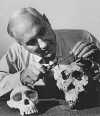 Leakey was a British anthropologist and archaeologist whose work helped establish the course of human evolution in Africa. The son of missionaries, Leakey grew up among the Kikuyu people of Kenya. After attending university in the UK, he returned to E Africa, where he and his wife discovered the first known remains of Homo habilis, an extinct species of hominin widely regarded as the earliest member of the human genus. Who are “Leakey’s Angels,” and what have they gone on to accomplish? Discuss
Leakey was a British anthropologist and archaeologist whose work helped establish the course of human evolution in Africa. The son of missionaries, Leakey grew up among the Kikuyu people of Kenya. After attending university in the UK, he returned to E Africa, where he and his wife discovered the first known remains of Homo habilis, an extinct species of hominin widely regarded as the earliest member of the human genus. Who are “Leakey’s Angels,” and what have they gone on to accomplish? Discuss
Source: The Free Dictionary
 Warhol, one of the most influential artists of the late 20th century, was the leading exponent of the pop art movement. Seeking to minimize the role of his own hand in his work, Warhol began mass-producing silkscreen paintings with the help of assistants at his studio, dubbed “the Factory.” His works, which are both popular and controversial, feature commonplace objects, such as dollar bills, soup cans, and soft-drink bottles, as well as celebrities like Marilyn Monroe. Who shot him in 1968?
Warhol, one of the most influential artists of the late 20th century, was the leading exponent of the pop art movement. Seeking to minimize the role of his own hand in his work, Warhol began mass-producing silkscreen paintings with the help of assistants at his studio, dubbed “the Factory.” His works, which are both popular and controversial, feature commonplace objects, such as dollar bills, soup cans, and soft-drink bottles, as well as celebrities like Marilyn Monroe. Who shot him in 1968? 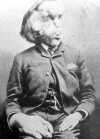 Known as “The Elephant Man,” Merrick was an Englishman who suffered from a severely disfiguring disease, mistakenly thought to have been elephantiasis, that caused growths all over his skin and bone surfaces and made it difficult for him to walk and speak. He escaped from a workhouse at 21 to join a freak show, where he was discovered by a physician who later admitted him to London Hospital. He was cared for there until his death at age 27. What rare syndrome likely caused his deformities?
Known as “The Elephant Man,” Merrick was an Englishman who suffered from a severely disfiguring disease, mistakenly thought to have been elephantiasis, that caused growths all over his skin and bone surfaces and made it difficult for him to walk and speak. He escaped from a workhouse at 21 to join a freak show, where he was discovered by a physician who later admitted him to London Hospital. He was cared for there until his death at age 27. What rare syndrome likely caused his deformities? 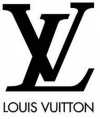 In 1835, Vuitton moved to Paris, where he became an apprentice malletier, or trunk-maker, crafting luggage for the French aristocracy. In 1854, he founded the company that would become a worldwide fashion icon. By 1885, the company had opened its first store in London. He introduced a line of innovative traveling trunks, and his designs soon became the subjects of widespread imitation—a trend that continues even today. What percent of the items bearing the Louis Vuitton monogram are counterfeit?
In 1835, Vuitton moved to Paris, where he became an apprentice malletier, or trunk-maker, crafting luggage for the French aristocracy. In 1854, he founded the company that would become a worldwide fashion icon. By 1885, the company had opened its first store in London. He introduced a line of innovative traveling trunks, and his designs soon became the subjects of widespread imitation—a trend that continues even today. What percent of the items bearing the Louis Vuitton monogram are counterfeit? 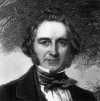 Paxton was an English architect noted for his use of glass and iron in a manner that anticipated modern methods. He began his career as a landscape gardener and built two innovative greenhouses for the duke of Devonshire. These “glass houses” later served as a model for the Crystal Palace, made of iron and glass, which Paxton designed and built for the Great Exhibition of 1851. He was knighted for the success of his design. One of Paxton’s greenhouses was designed solely to house what plant?
Paxton was an English architect noted for his use of glass and iron in a manner that anticipated modern methods. He began his career as a landscape gardener and built two innovative greenhouses for the duke of Devonshire. These “glass houses” later served as a model for the Crystal Palace, made of iron and glass, which Paxton designed and built for the Great Exhibition of 1851. He was knighted for the success of his design. One of Paxton’s greenhouses was designed solely to house what plant? 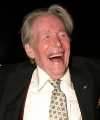 O’Toole, a classical stage actor, debuted in London in 1956 and has since played a variety of Shakespearean roles. Tall and handsome, he catapulted to stardom in 1962 with his portrayal of British Army officer T. E. Lawrence in the desert epic Lawrence of Arabia. He went on to win praise for performances in films ranging from historical drama to high comedy and, though he never won, has been nominated for an Academy Award eight times. Despite this record, he received what award in 2003?
O’Toole, a classical stage actor, debuted in London in 1956 and has since played a variety of Shakespearean roles. Tall and handsome, he catapulted to stardom in 1962 with his portrayal of British Army officer T. E. Lawrence in the desert epic Lawrence of Arabia. He went on to win praise for performances in films ranging from historical drama to high comedy and, though he never won, has been nominated for an Academy Award eight times. Despite this record, he received what award in 2003? 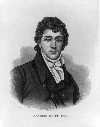 After the burning of Washington, DC, by the British in the War of 1812, Key, an American lawyer, was sent to secure the release of a friend from a British ship in Chesapeake Bay. That night, while temporarily detained on a British vessel, Key witnessed the British shelling of Fort McHenry. When he saw the American flag still flying the next morning, he was inspired to write “Defense of Fort M’Henry,” a poem that was adopted as the US national anthem in 1931. To what melody was the poem set?
After the burning of Washington, DC, by the British in the War of 1812, Key, an American lawyer, was sent to secure the release of a friend from a British ship in Chesapeake Bay. That night, while temporarily detained on a British vessel, Key witnessed the British shelling of Fort McHenry. When he saw the American flag still flying the next morning, he was inspired to write “Defense of Fort M’Henry,” a poem that was adopted as the US national anthem in 1931. To what melody was the poem set? 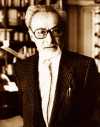 Two years after earning a degree in chemistry, Levi, an Italian Jew, was captured by the Nazis and sent to Auschwitz. He later recounted the atrocities he witnessed in autobiographical novels including If This Is a Man, which has been described as one of the most important works of the 20th century. His best known work, The Periodic Table, is a collection of 21 meditations, each named for a chemical element. What entertainer has Levi’s concentration camp number tattooed on his arm?
Two years after earning a degree in chemistry, Levi, an Italian Jew, was captured by the Nazis and sent to Auschwitz. He later recounted the atrocities he witnessed in autobiographical novels including If This Is a Man, which has been described as one of the most important works of the 20th century. His best known work, The Periodic Table, is a collection of 21 meditations, each named for a chemical element. What entertainer has Levi’s concentration camp number tattooed on his arm? 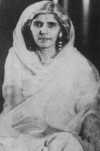 Commonly known in Pakistan as Khatoon-e-Pakistan and Madar-e-Millat—Urdu for “Lady of Pakistan” and “Mother of the Nation,” respectively—Jinnah was the sister of Muhammad Ali Jinnah, the founder of Pakistan, and an active figure in the movement for independence from the British Raj. She remained politically active after her brother’s death and even ran for president in 1965, though she lost by a narrow margin. What was Jinnah’s occupation before she became involved in politics?
Commonly known in Pakistan as Khatoon-e-Pakistan and Madar-e-Millat—Urdu for “Lady of Pakistan” and “Mother of the Nation,” respectively—Jinnah was the sister of Muhammad Ali Jinnah, the founder of Pakistan, and an active figure in the movement for independence from the British Raj. She remained politically active after her brother’s death and even ran for president in 1965, though she lost by a narrow margin. What was Jinnah’s occupation before she became involved in politics? 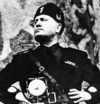 An ardent socialist in his youth, Mussolini turned nationalist after serving with the Italian army in WWI. He formed a fascist political group in 1919 and was soon appointed prime minister, becoming the youngest in Italian history. Supported by Adolf Hitler, Mussolini declared war on the Allies in 1940. As German defenses in Italy collapsed, Mussolini tried to escape to Austria but was captured and executed by Italian partisans. During his rule, he was known as Il Duce, which means what?
An ardent socialist in his youth, Mussolini turned nationalist after serving with the Italian army in WWI. He formed a fascist political group in 1919 and was soon appointed prime minister, becoming the youngest in Italian history. Supported by Adolf Hitler, Mussolini declared war on the Allies in 1940. As German defenses in Italy collapsed, Mussolini tried to escape to Austria but was captured and executed by Italian partisans. During his rule, he was known as Il Duce, which means what?